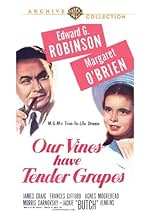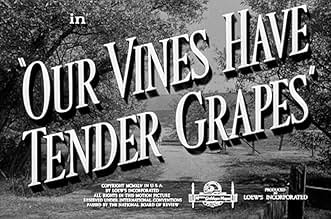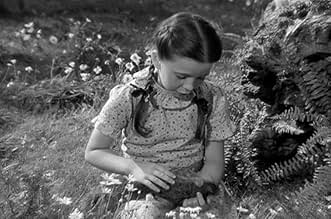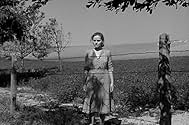AVALIAÇÃO DA IMDb
7,6/10
2,5 mil
SUA AVALIAÇÃO
Adicionar um enredo no seu idiomaA Norwegian farmer lovingly raises his daughter in rural World War II-era Benson Junction, Wisconsin.A Norwegian farmer lovingly raises his daughter in rural World War II-era Benson Junction, Wisconsin.A Norwegian farmer lovingly raises his daughter in rural World War II-era Benson Junction, Wisconsin.
- Direção
- Roteiristas
- Artistas
- Prêmios
- 2 vitórias no total
Abigail Adams
- Girl
- (não creditado)
Robert Anderson
- School Boy
- (não creditado)
- Direção
- Roteiristas
- Elenco e equipe completos
- Produção, bilheteria e muito mais no IMDbPro
Avaliações em destaque
I'm normally a pretty sensitive guy but rare is the time, especially with movies these days (I'm in my early 40s), that I feel joy or sorrow or anything at all, for that matter, at a movie. I think most of them are made by people who have nothing to say.
This film is different. I actually found myself a couple times with tears rolling down my cheeks and I was happy to have that feeling. And there were times that my heart soared here too.
I must first say that I have always loved Edward G. From Little Caesar to The Sea Wolf and more, this is an actor's actor. He is authoratative here for sure, but in a tender and fair way. It made me see him in a completely different and more sympathetic light. He is a real "little guy" here. When he balks
at physically punishing his daughter for being selfish with the roller skates, I wish I could make every parent today see that scene.
Strange as it may seem, Agnes Moorehead is an idea match wife for Edward G.
Known for "Bewitched" or Orson Wellesian weirdo-type characters, we usually
see her as kind of a cold loser whose life has passed her by. She is so credible and so good here, you can see a light shine from within. When she expresses
pride in the children, it is real. Robinson and Moorehead are what make this
movie real and are the forces of good who influence children to grow up right.
Now a word about the courtroom scene when the girl offers her calf and
everyone starts offering increasingly valuable parts of the farm to give to the stricken farmer. To say this scene reflected communism is like saying It's a
Wonderful Life reflects communism. It's totally ridiculous. It is Capra-corn of the highest order and is just one of many scenes in a movie performed by people
who believe every word the screenwriter wrote, directed by a person of vision and written with a heart.
So if you are a bit more sentimental and want a film that is real and has a heart, and is far enough removed from all the ADD and ritalin and child abuse we
have now, this one will make you forget about the regrettable way things go
today and the way things should be.
This film is different. I actually found myself a couple times with tears rolling down my cheeks and I was happy to have that feeling. And there were times that my heart soared here too.
I must first say that I have always loved Edward G. From Little Caesar to The Sea Wolf and more, this is an actor's actor. He is authoratative here for sure, but in a tender and fair way. It made me see him in a completely different and more sympathetic light. He is a real "little guy" here. When he balks
at physically punishing his daughter for being selfish with the roller skates, I wish I could make every parent today see that scene.
Strange as it may seem, Agnes Moorehead is an idea match wife for Edward G.
Known for "Bewitched" or Orson Wellesian weirdo-type characters, we usually
see her as kind of a cold loser whose life has passed her by. She is so credible and so good here, you can see a light shine from within. When she expresses
pride in the children, it is real. Robinson and Moorehead are what make this
movie real and are the forces of good who influence children to grow up right.
Now a word about the courtroom scene when the girl offers her calf and
everyone starts offering increasingly valuable parts of the farm to give to the stricken farmer. To say this scene reflected communism is like saying It's a
Wonderful Life reflects communism. It's totally ridiculous. It is Capra-corn of the highest order and is just one of many scenes in a movie performed by people
who believe every word the screenwriter wrote, directed by a person of vision and written with a heart.
So if you are a bit more sentimental and want a film that is real and has a heart, and is far enough removed from all the ADD and ritalin and child abuse we
have now, this one will make you forget about the regrettable way things go
today and the way things should be.
Sure, maybe the movie harkens back to a simpler time and maybe life really didn't go this way for alot of people, but this is a sweet movie- the likes we don't really see too much of these days. I did find myself waiting for the inevitable "other shoe to drop" as things were really going too well for the main characters and in all movies- something bad usually happens. I have read other comments here regarding this movie and it's supposed communist undertones- if giving of yourself to help someone that lost everything in a fire is communist- then I'm all for it. Edward G Robinson is hard working, sweet and gentle- without being mushy- it's a simple film that is nice to watch for it's wholesomeness. There are some unhappy parts- a barn burning- and a lesson that even when you get something that you have wanted for your whole life, things can be taken away in the blink of an eye. It's a wonderful movie and has alot of the things I watch some classic movies for: a charm and sweetness that involves no sex and violence- it doesn't need to to get it's message across.
This simple story offers sentiment without saccharine in its story of a farming family in a small community. Episodic in nature, the film follows the adventures of daughter Selma (Margaret O'Brien) and her friend Arnold (Jackie "Butch" Jenkins) as they, like the crops under her parents' care, grow into caring, loving individuals.
The cast is the great thing here. O'Brien was a gifted little actress, charming in her prissiness, and Jenkins equals her as her slightly pouty friend. Both offer memorable performances--but the truly remarkable performances here, the ones for which the film should be prized, come from Edward G. Robinson and Agnes Moorehead, who are cast against type in the roles of Selma's parents. Robinson, of course, is best remembered for his tough-guy roles, full of energetic bluster; Moorehead is most often recalled as one of the most memorable shrews in Hollywood history. But both show the range of their talents in this film, playing quietly, simply, and very movingly--and one regrets that both (particularly Moorehead) were not given more opportunity to play such in-depth roles more often.
Ultimately, VINES is about how parents teach their children and shape their lives--and about how children, for good or ill, learn from their parents. Simply filmed, beautifully performed, and memorable from start to finish, it is a film that deserves wider recognition than it normally receives. An excellent family film that both parents and children will enjoy.
Gary F. Taylor, aka GFT, Amazon Reviewer
The cast is the great thing here. O'Brien was a gifted little actress, charming in her prissiness, and Jenkins equals her as her slightly pouty friend. Both offer memorable performances--but the truly remarkable performances here, the ones for which the film should be prized, come from Edward G. Robinson and Agnes Moorehead, who are cast against type in the roles of Selma's parents. Robinson, of course, is best remembered for his tough-guy roles, full of energetic bluster; Moorehead is most often recalled as one of the most memorable shrews in Hollywood history. But both show the range of their talents in this film, playing quietly, simply, and very movingly--and one regrets that both (particularly Moorehead) were not given more opportunity to play such in-depth roles more often.
Ultimately, VINES is about how parents teach their children and shape their lives--and about how children, for good or ill, learn from their parents. Simply filmed, beautifully performed, and memorable from start to finish, it is a film that deserves wider recognition than it normally receives. An excellent family film that both parents and children will enjoy.
Gary F. Taylor, aka GFT, Amazon Reviewer
Every once in a while, Hollywood would turn out simple, almost humble films that were salutes to a kind of idealized America that still resonates in our collective American memory. "I Remember Mama" is one example, and the Norwegian-American community must have been a rich source for such reflection, because the Norwegian-Americans of Fuller Junction, Wisconsin, are the subject of yet another in "Our Vines Have Tender Grapes." It's amusing that the source of the title is the line from the Song of Songs that begins, "The Little Foxes"--a quote that made the title of quite a different film about quite different American values.
"Our Vines Have Tender Grapes" traces the fortunes of a small middle-American community, with particular focus on the Jacobson family, consisting of father Martinius (Edward G. Robinson), mother Bruna (Agnes Moorehead), and 7-year-old Selma (Margaret O'Brien). Selma's cousin Arnold is also featured, as is the editor of the local paper, other farming neighbors, the new schoolteacher (doing her practicum for a PhD in education, back in Milwaukee), and others.
There isn't necessarily a narrative here; the film provides an episodic look at a year in the life of this community, with tragedy, comedy, and all the human drama. Sometimes it gets a little too episodic, perhaps, as in the dribs of information we get on the life of an emotionally-disturbed neighbor girl. But we are not being asked to follow a narrative, we are merely being asked to spend some time with these people and observe their lives.
The request pays back the time spent. All the performances (with the possible exception of a rather wooden Butch Jenkins as Arnold, whose lips can be seen to move with Margaret O'Brien's lines in their first scene) are engaging. The great Edward G. Robinson once again shows his range (was there any kind of role that man couldn't play??), and Agnes Moorehead gets a chance to show range she isn't generally allowed to display. Margaret O'Brien's Selma can be seen as an outgrowth of Tootie from "Meet Me in St Louis," but I believe Selma is a much more emotionally-complex part and O'Brien takes that ball and runs with it. Her rendition of the Nativity story is JUST this side of saccharine, and it works, especially given the visceral punch of the final lines.
The screenplay was written by Dalton Trumbo, in his last Hollywood effort before the blacklist. Trumbo got the story from a book by George Victor Martin, who was the husband of the woman Selma became. According to the catalog of the American Film Institute, Selma Martin (then estranged from her husband) and her cousin Arnold sued MGM on the basis that the film caused them "undue public attention, mental anguish and humiliation." Staggering news, given the gentle, lovely portrayals of them the film provides.
This film shows up on Turner Classic Movies from time to time. You won't regret giving a couple of hours of your day to this story; it's truly worth it.
"Our Vines Have Tender Grapes" traces the fortunes of a small middle-American community, with particular focus on the Jacobson family, consisting of father Martinius (Edward G. Robinson), mother Bruna (Agnes Moorehead), and 7-year-old Selma (Margaret O'Brien). Selma's cousin Arnold is also featured, as is the editor of the local paper, other farming neighbors, the new schoolteacher (doing her practicum for a PhD in education, back in Milwaukee), and others.
There isn't necessarily a narrative here; the film provides an episodic look at a year in the life of this community, with tragedy, comedy, and all the human drama. Sometimes it gets a little too episodic, perhaps, as in the dribs of information we get on the life of an emotionally-disturbed neighbor girl. But we are not being asked to follow a narrative, we are merely being asked to spend some time with these people and observe their lives.
The request pays back the time spent. All the performances (with the possible exception of a rather wooden Butch Jenkins as Arnold, whose lips can be seen to move with Margaret O'Brien's lines in their first scene) are engaging. The great Edward G. Robinson once again shows his range (was there any kind of role that man couldn't play??), and Agnes Moorehead gets a chance to show range she isn't generally allowed to display. Margaret O'Brien's Selma can be seen as an outgrowth of Tootie from "Meet Me in St Louis," but I believe Selma is a much more emotionally-complex part and O'Brien takes that ball and runs with it. Her rendition of the Nativity story is JUST this side of saccharine, and it works, especially given the visceral punch of the final lines.
The screenplay was written by Dalton Trumbo, in his last Hollywood effort before the blacklist. Trumbo got the story from a book by George Victor Martin, who was the husband of the woman Selma became. According to the catalog of the American Film Institute, Selma Martin (then estranged from her husband) and her cousin Arnold sued MGM on the basis that the film caused them "undue public attention, mental anguish and humiliation." Staggering news, given the gentle, lovely portrayals of them the film provides.
This film shows up on Turner Classic Movies from time to time. You won't regret giving a couple of hours of your day to this story; it's truly worth it.
One of Edward G. Robinson's most beloved films is this one in which he totally reverses type and becomes the wise father of Margaret O'Brien. Our Vines Have Tender Grapes and the tender grapes referred to are the children in their innocence, Margaret O'Brien and Jackie Jenkins.
In this rural Wisconsin town where few even have electricity, the settlers are mostly Norwegian immigrants who did like our American Midwest climate because it was so similar to Norway. They are a tight knit group and are a reserved bunch. But as the film shows, during a crisis they do come together.
O'Brien and Jenkins are an appealing pair of youngsters. Their childhood is a whole lot like Tom Sawyer's and Huck Finn's. Of course in one instance they try duplicating something Tom and Huck did that nearly turns tragic.
Agnes Moorehead also shows what a capable player she is in playing Robinson's wife and O'Brien's mother. I'm sure she was grateful for not playing an evil woman for a change.
There is a subplot involving a romance of editor James Craig and new school teacher Frances Gifford. Gifford is first quite resistant to the town, she's a big city girl, but she warms up to them and Craig.
But the film really belongs to Robinson and O'Brien. Robinson has a tough fight, but he more than holds his own in scenes with the little moppet. Sad he didn't do more films like this.
Our Vines Have Tender Grapes is a timeless classic, I think children and families of any age will identify and love it.
In this rural Wisconsin town where few even have electricity, the settlers are mostly Norwegian immigrants who did like our American Midwest climate because it was so similar to Norway. They are a tight knit group and are a reserved bunch. But as the film shows, during a crisis they do come together.
O'Brien and Jenkins are an appealing pair of youngsters. Their childhood is a whole lot like Tom Sawyer's and Huck Finn's. Of course in one instance they try duplicating something Tom and Huck did that nearly turns tragic.
Agnes Moorehead also shows what a capable player she is in playing Robinson's wife and O'Brien's mother. I'm sure she was grateful for not playing an evil woman for a change.
There is a subplot involving a romance of editor James Craig and new school teacher Frances Gifford. Gifford is first quite resistant to the town, she's a big city girl, but she warms up to them and Craig.
But the film really belongs to Robinson and O'Brien. Robinson has a tough fight, but he more than holds his own in scenes with the little moppet. Sad he didn't do more films like this.
Our Vines Have Tender Grapes is a timeless classic, I think children and families of any age will identify and love it.
Você sabia?
- CuriosidadesJerry Maren, a member of the Lollipop Guild from O Mágico de Oz (1939), stood in for Margaret O'Brien in the scene where she is floating down the river in a bathtub.
- Erros de gravaçãoIn the opening scene, during the two-shot of Selma Jacobson and Arnold Hanson, he can be seen mouthing her lines as she says them.
- Citações
Martinius Jacobson: [Entering Bjornson's new barn] You can still smell the new wood... finest smell on the earth.
- ConexõesFeatured in A Night at the Movies: Merry Christmas! (2011)
- Trilhas sonorasEntry of the Gladiators
(1897) (uncredited)
Written by Julius Fucík
In the score during the elephant sequence
Principais escolhas
Faça login para avaliar e ver a lista de recomendações personalizadas
- How long is Our Vines Have Tender Grapes?Fornecido pela Alexa
Detalhes
- Data de lançamento
- País de origem
- Idioma
- Também conhecido como
- El sol sale mañana
- Locações de filme
- Empresa de produção
- Consulte mais créditos da empresa na IMDbPro
- Tempo de duração1 hora 45 minutos
- Cor
- Proporção
- 1.37 : 1
Contribua para esta página
Sugerir uma alteração ou adicionar conteúdo ausente
























